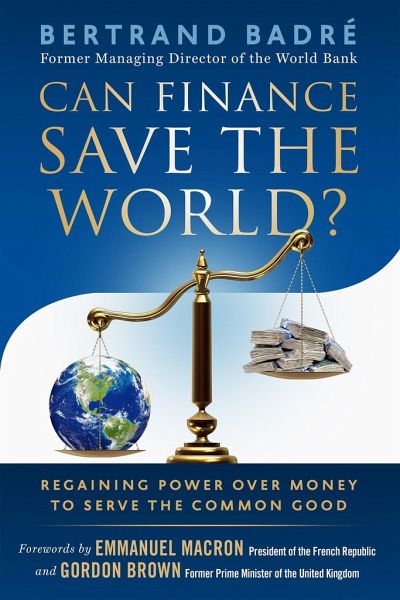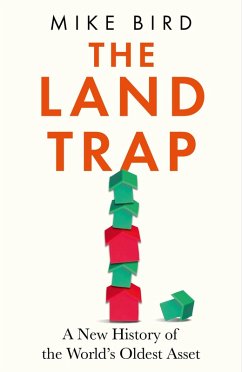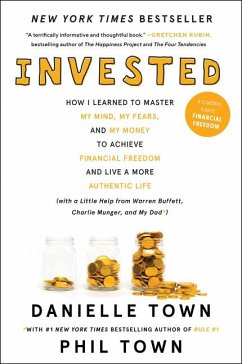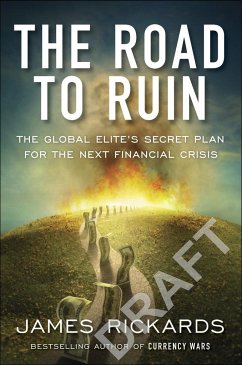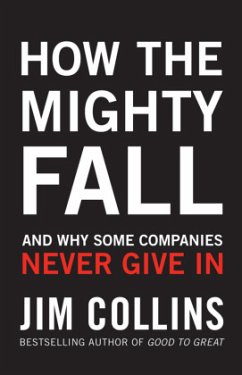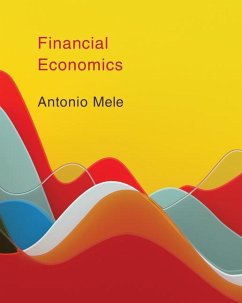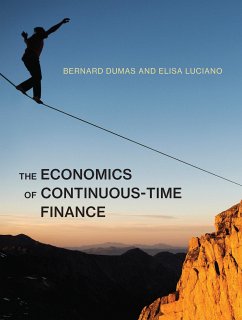Can Finance Save the World?
Regaining Power Over Money to Serve the Common Good
Versandkostenfrei!
Liefertermin unbestimmt
Weitere Ausgaben:





A hugely important book [with] a compelling vision for ethical global finance that makes current political debates seem petty and thoughtless. (Lawrence H. Summers, former U.S. Treasury Secretary)According to Bertrand Badré, finance is neither inherently good nor bad. It's just a tool the most powerful tool on earth. In Can Finance Save the World?, he describes innovative approaches and financial tools that can help us address many of the world's biggest problems, ranging from climate change to the eradication of poverty to building much-needed infrastructure. Badré details options for creat...
A hugely important book [with] a compelling vision for ethical global finance that makes current political debates seem petty and thoughtless. (Lawrence H. Summers, former U.S. Treasury Secretary)
According to Bertrand Badré, finance is neither inherently good nor bad. It's just a tool the most powerful tool on earth. In Can Finance Save the World?, he describes innovative approaches and financial tools that can help us address many of the world's biggest problems, ranging from climate change to the eradication of poverty to building much-needed infrastructure. Badré details options for creating positive financial regulation and for strengthening international cooperation. He also explains what is working and what needs to change in financing the sustainable development of the world.
This book is rich with practical examples, some developed by Badré himself. For instance, he describes how at the World Bank he devised an innovative way to use insurance, a financialtool rarely considered in international development, to buttress fragile emerging economies against natural disasters and pandemics. Initiatives like these show that, as Badré writes, when controlled and used intelligently, with benevolence and inventiveness, finance can accomplish great things.
According to Bertrand Badré, finance is neither inherently good nor bad. It's just a tool the most powerful tool on earth. In Can Finance Save the World?, he describes innovative approaches and financial tools that can help us address many of the world's biggest problems, ranging from climate change to the eradication of poverty to building much-needed infrastructure. Badré details options for creating positive financial regulation and for strengthening international cooperation. He also explains what is working and what needs to change in financing the sustainable development of the world.
This book is rich with practical examples, some developed by Badré himself. For instance, he describes how at the World Bank he devised an innovative way to use insurance, a financialtool rarely considered in international development, to buttress fragile emerging economies against natural disasters and pandemics. Initiatives like these show that, as Badré writes, when controlled and used intelligently, with benevolence and inventiveness, finance can accomplish great things.
Bertrand Badré is CEO and founder of Blue like an Orange Sustainable Capital. Previously, he was managing director of the World Bank; chief financial officer of the World Bank Group; CFO at two of the world's largest banks, Crédit Agricole and Société Générale Group; and a partner of Lazard. Foreword by Emmanuel Macron, President of the French Republic. Foreword by Gordon Brown, Former Prime Minister of Great Britain from 2007-2010 and is currently the United Nations Special Envoy for Global Education.
Produktdetails
- Verlag: Berrett-Koehler Publishers
- Seitenzahl: 288
- Erscheinungstermin: 30. Januar 2018
- Englisch
- Abmessung: 228mm x 151mm x 22mm
- Gewicht: 386g
- ISBN-13: 9781523094219
- ISBN-10: 1523094214
- Artikelnr.: 47366488
Herstellerkennzeichnung
Libri GmbH
Europaallee 1
36244 Bad Hersfeld
gpsr@libri.de
2019 Independent Publisher Book Awards silver medalist in the Finance/Investment/Economics category.
Agree or disagree, Bertrand Badré has written a hugely important book on the future of finance. He provides a compelling vision for ethical global finance that makes current political debates seem petty and thoughtless.
Lawrence H. Summers, Charles W. Eliot University Professor, Harvard University
Bertrand Badré knows as well as anyone what gave rise to the disenchantment with the world of finance. His aim in this important and provocative book is to point to a new world in which finance is no longer a threat but becomes a handmaiden to order, stability, confidence, growth, and greater equality. It is, as
Agree or disagree, Bertrand Badré has written a hugely important book on the future of finance. He provides a compelling vision for ethical global finance that makes current political debates seem petty and thoughtless.
Lawrence H. Summers, Charles W. Eliot University Professor, Harvard University
Bertrand Badré knows as well as anyone what gave rise to the disenchantment with the world of finance. His aim in this important and provocative book is to point to a new world in which finance is no longer a threat but becomes a handmaiden to order, stability, confidence, growth, and greater equality. It is, as
Mehr anzeigen
he calls it, a cry from the heart that, in spite of all the differences among nations and individuals, we are basically in agreement on most of the major challenges we face. The book is both a plea to world leaders in the political and economic realms to unite and a conviction that this is now possible in spite of the rising nationalistic fervor.
Ezra Suleiman, Professor of Politics and IBM Professor of International Studies, Princeton University
Bertrand has definitely witnessed the financial crisis from the inside and has drawn important lessons. More importantly, this book shows that things can actually be done, walking the talk rather than just talking the talk.
Ricardo Ernst, PhD, Baratta Chair in Global Business and Professor of Operations and Global Logistics, McDonough School of Business, Georgetown University
Creating a world where no one is left behind requires a clear road map. We have the sustainable development goals, and Bertrand explains how the financial system can play a more effective role to help them come alive.
Paul Polman, CEO, Unilever
A wake-up call. An expert s valuable overview of the need to support the nascent revolution in finance to improve lives.
Sir Ronald Cohen, Chair, Global Social Impact Investment Steering Group, and cofounder of Apax Partners
This book is a must-read for anyone interested in understanding why finance has become such a powerful force for our times. Can finance save the world? Maybe, but it could also cripple it. Badré s insights reflect the rare combination of a keen intellect and a wealth of hands-on experience in the world of international finance.
Masood Ahmed, President, Center for Global Development
This book is a powerful call to action for global leaders to reinvent the way that the public, private, and social sectors collaborate and describes the important and unexpected role that finance can play in uniting stakeholders across political and socioeconomic boundaries.
Dominic Barton, Global Managing Partner, McKinsey & Company
Finance can do a lot of bad. But it can also do a lot of good. Bertrand Badré s book shows concretely how, with a focus on public-private partnerships, and the specific role of multinational development banks. This is important, practical, work.
Olivier Blanchard, Fred Bergsten Senior Fellow, Peterson Institute for International Economics, and Robert Solow Professor Emeritus, Massachusetts Institute of Technology
Everyone says we need more public investment. Everyone says the public and private sectors must work together. Nobody has told us how until Badré spelled it out practically and providentially in this book.
Adam S. Posen, President, Peterson Institute for International Economics
Colorful, confronting, and compelling! Bertrand Badré presents the case for reshaping the international financial architecture and mobilizing global financial flows as drivers of inclusive growth. This book is a call to action for all of us as we continue to grapple with the legacies of the global financial crisis. We need fresh thinking and new approaches to make sure globalization works for all and to achieve the ambition of the Paris Agreement, the 2030 Agenda for Sustainable Development, and the tax transparency agenda. Finance has a critical role to play in these collective efforts.
Angel Gurría, Secretary General, Organisation for Economic Co-operation and Development
Bertrand Badré makes a convincing argument for how financial institutions and particularly multilateral development banks can help humanity conquer some of its greatest challenges, from climate change to the quest for building more equitable societies. His book is a valuable contribution to the debate about development finance.
Luis Alberto Moreno, President, Inter-American Development Bank
Bertrand Badré s creative and insightful book on international finance paints a holistic picture of the practical and ethical dimensions of this very important social tool. He draws on a rich background in both government and the private sector, culminating with his path-breaking tenure as chief financial officer of the World Bank Group. His reflections on the impact of well-applied financial tools on development and social inclusion are of special interest.
John D. Negroponte, former US Permanent Representative to the United Nations and former Deputy Secretary of State
Building on the seminal idea that finance, like any human activity, is here to serve the common good, Bertrand Badré outlines in this easy-to-read book a number of avenues that humankind can and should explore and embrace to address the challenges it faces today, using finance as a tool, not an end. An inspiring and practical invitation to choose the right path at the crossroad the world finds itself at.
Hubert Joly, Chairman and CEO, Best Buy
It has been a long-held belief of mine that leveraging the private sector much more efficiently as well as being innovative in how we use capital are two of the essential keys to unlocking development. Bertrand Badré carries these as central themes throughout his well-argued book. What is even more impressive is Bertrand s bold move to implement what has long been discussed in theory into real life and concrete action. This is why I am really proud to support him and Blue like an Orange.
Olivier Goudet, CEO, JAB Group, and Chairman, Anheuser-Busch InBev
From the G8, G20, and World Bank Board discussions to insurance and derisking in concrete cases in the poorest parts of the world, Bertrand Badré offers a holistic view of finance. Like technology, it is neither good nor bad in itself. But an intelligent partnership between private financial institutions, international organizations, governments, and the philanthropic sector can produce fabulous results. To help us understand how these partnerships can be crafted and the crucial role domesticated financial institutions can play, he draws on his deep experience in both the public and the private sectors. A must-read for the development finance community.
Kemal Dervis, Director of Global Economy and Development, Brookings Institution, and former head of the United Nations Development Programme
In these times of uncertainty and increasing nationalism, Badré makes a powerful case for the inherently global nature of finance and its capacity to be used as a tool for good.
Agustín Guillermo Carstens Carstens, Governor, Banco de México
Can finance be a force for good? When a PPP (a person with in-depth private practice and a profound public commitment) proposes that PPP (private public partnership) improves people s lives and future, then it can prove transformational for the role and purpose of finance and help make progress on the road to the sustainable development goals.
Christine Lagarde, Managing Director, International Monetary Fund
Drawing on deep expertise, wide-ranging practical experience, and the vantage point of a thoughtful insider, Bertrand Badré provides important insights on how society can and should regain control of a bipolar finance system to deliver better and more sustainable outcomes for more people around the world. This passionate case for better finance will be of particular interest to thought leaders and policymakers looking for practical ways to turn an inherently powerful force for empowerment and inclusion but also for alienation and inequality into a stronger contributor to the common good.
Mohamed El-Erian, Chief Economic Advisor, Allianz; former CEO, PIMCO; and author of The Only Game in Town
Bertrand Badré and I worked on promoting the G20 infrastructure agenda during the Australian presidency. The ideas we pushed are the ones that are at the heart of Can Finance Save the World? Ideas are essential, but this book is about trying and doing. A true call for action.
Honorable Joe Hockey, Australian Ambassador to the United States, former Treasurer of Australia, and former Chair, G20
A blueprint for forceful, collective action. Against a rising tide of economic nationalism, Badré lays the course to address an unprecedented range of global threats climate change, pandemics, inadequate access to infrastructure and water, and refugee crises. With his new venture, Blue like an Orange, Badré is also practicing what he preaches, reimagining finance as an equalizing force for the vulnerable among us.
Antonio Weiss, Senior Fellow, Harvard Kennedy School
Bertrand Badré is a practical visionary. He fully recognizes the power of the backlash against financial globalization. But finance is an essential tool. As he argues in this heartwarming book, innovative partnerships between the public and the private sectors remain essential if we are to enjoy a cooperative world and a better future.
Martin Wolf, Chief Economics Commentator, Financial Times
In a world where the financial crisis often evokes the attribution of blame and the search for culprits, this book is refreshingly different. Written by someone with a deep understanding of both the flaws and the possibilities of the financial system, it presents a level-headed analysis of what went wrong. However, it goes much further and offers a constructive view of what can be achieved if we move beyond the postmortem and remember what tremendous potential finance can bring to economic and social development. Indeed, it argues for the right kind of innovation in our financial system as an indispensable ingredient to solve many of today s global problems and create a more equitable world. Bertrand Badré is at the cutting edge of impact investing, blended finance, and many other techniques that align financial and social interests, moving from a purely financial paradigm to one that recognizes the true multitude of legitimate stakeholders. Practitioners in both finance and development will find his elaborations very relevant for improving outcomes in their field.
Klaus Schwab, Executive Chairman, World Economic Forum
Postcrisis financial reform efforts have focused on how to make the global system safer so that it can t happen again. Bertrand Badré instead addresses the forward-looking challenge of making finance effectively serve broader interests of social and environmental progress, in addition to promoting growth. With his unique background of high-level service in government, in major financial firms, and at the World Bank, Badré demonstrates in this wide-ranging volume how a new and creative approach to public-private cooperation in finance inevitably will be required for any serious attempt to simultaneously attain these fundamental goals. His thought-provoking observations are both visionary and practical.
John Lipsky, Senior Fellow,Johns Hopkins School of Advanced International Studies, and former First Deputy Managing Director, International Monetary Fund
When the global community set seventeen ambitious goals to reach by 2030 as part of the new sustainable development agenda, Bertrand Badré played a key role in providing the analysis of the role of finance in achieving these goals. We all agreed that the way forward was not going to be business as usual. Two years later, there are still too few examples of rhetoric turned into action. This is why this book is so helpful, important, and timely as it serves as a how-to guide to inspire action among a multistakeholder society.
Charlotte Petri Gornitzka, Chair, Development Assistance Committee, Organisation for Economic Co-operation and Development
With the world having signed onto the UN s sustainable development goals to be achieved by 2030, and given the multiple pressures on scarce foreign aid spending, we simply cannot achieve our goals without the private financial markets doing their part. Bertrand lays out an ambitious, but I believe completely doable, path for the public and private financial markets to take to achieve our common human objectives. And he makes a forceful argument for why it is in the best and self-interest of the financial sector to feel responsible for helping achieve the goals the world has set and to help eliminate the growing cancer of increasing inequality.
Ray Chambers, UN Secretary-General s Special Envoy for Health in Agenda 2030 and for Malaria and former Chairman, Wesray Capital Corporation
Bertrand highlights the incredible power of finance as an agent for good in the world. The global financial crisis shook the world s confidence in the financial system, and the resulting regulations may have significantly curtailed the ability of millions to benefit from the power of finance. To build an inclusive world, Bertrand lays out ideas on how finance can be used as a force for good and inclusion. Such inclusion will significantly help reduce the societal unease that is leading to political crisis in many countries by allowing humanity to address some of its most pressing problems, including global warming, pandemics, and inequality.
Paul Desmarais III, Senior Vice President, Power Financial Corporation, and Executive Chairman, Portag3 Ventures and Sagard Holdings
In a straightforward and captivating way, Bertrand Badré has written a compelling book on the fascinating story of finance throughout its turbulent last thirty years, outlining the connections between pressing global issues climate change, nationalism, populism, poverty and the crisis of confidence in the financial system. In times of global uncertainties and challenges, his book is a passionate call for leadership and joint action. As Badré reminds us, finance is not a blind and uncontrollable force. It is not good or bad in itself but as good as we use it and, going forward, we will indeed have to use this tool a lot and as wisely as we can to master the global challenges that we all face together.
Dr. Werner Hoyer, President, European Investment Bank
Bertrand s critical expertise, acquired through his work at the heart of the financial system over three decades, is brought to the fore in this outstanding work. We all have a stake in ensuring that the international finance system succeeds and serves society, not the other way around. In his book, Bertrand not only makes the case for why we must all work together to deliver this goal but also provides concrete suggestions for how to achieve it. Students, teachers, and professionals in international finance should read with interest, consider the difficult questions that Bertrand poses, and heed the advice of a man who has seen so much.
Mark Carney, Governor, Bank of England, and Chairman, G20 Financial Stability Board
Ezra Suleiman, Professor of Politics and IBM Professor of International Studies, Princeton University
Bertrand has definitely witnessed the financial crisis from the inside and has drawn important lessons. More importantly, this book shows that things can actually be done, walking the talk rather than just talking the talk.
Ricardo Ernst, PhD, Baratta Chair in Global Business and Professor of Operations and Global Logistics, McDonough School of Business, Georgetown University
Creating a world where no one is left behind requires a clear road map. We have the sustainable development goals, and Bertrand explains how the financial system can play a more effective role to help them come alive.
Paul Polman, CEO, Unilever
A wake-up call. An expert s valuable overview of the need to support the nascent revolution in finance to improve lives.
Sir Ronald Cohen, Chair, Global Social Impact Investment Steering Group, and cofounder of Apax Partners
This book is a must-read for anyone interested in understanding why finance has become such a powerful force for our times. Can finance save the world? Maybe, but it could also cripple it. Badré s insights reflect the rare combination of a keen intellect and a wealth of hands-on experience in the world of international finance.
Masood Ahmed, President, Center for Global Development
This book is a powerful call to action for global leaders to reinvent the way that the public, private, and social sectors collaborate and describes the important and unexpected role that finance can play in uniting stakeholders across political and socioeconomic boundaries.
Dominic Barton, Global Managing Partner, McKinsey & Company
Finance can do a lot of bad. But it can also do a lot of good. Bertrand Badré s book shows concretely how, with a focus on public-private partnerships, and the specific role of multinational development banks. This is important, practical, work.
Olivier Blanchard, Fred Bergsten Senior Fellow, Peterson Institute for International Economics, and Robert Solow Professor Emeritus, Massachusetts Institute of Technology
Everyone says we need more public investment. Everyone says the public and private sectors must work together. Nobody has told us how until Badré spelled it out practically and providentially in this book.
Adam S. Posen, President, Peterson Institute for International Economics
Colorful, confronting, and compelling! Bertrand Badré presents the case for reshaping the international financial architecture and mobilizing global financial flows as drivers of inclusive growth. This book is a call to action for all of us as we continue to grapple with the legacies of the global financial crisis. We need fresh thinking and new approaches to make sure globalization works for all and to achieve the ambition of the Paris Agreement, the 2030 Agenda for Sustainable Development, and the tax transparency agenda. Finance has a critical role to play in these collective efforts.
Angel Gurría, Secretary General, Organisation for Economic Co-operation and Development
Bertrand Badré makes a convincing argument for how financial institutions and particularly multilateral development banks can help humanity conquer some of its greatest challenges, from climate change to the quest for building more equitable societies. His book is a valuable contribution to the debate about development finance.
Luis Alberto Moreno, President, Inter-American Development Bank
Bertrand Badré s creative and insightful book on international finance paints a holistic picture of the practical and ethical dimensions of this very important social tool. He draws on a rich background in both government and the private sector, culminating with his path-breaking tenure as chief financial officer of the World Bank Group. His reflections on the impact of well-applied financial tools on development and social inclusion are of special interest.
John D. Negroponte, former US Permanent Representative to the United Nations and former Deputy Secretary of State
Building on the seminal idea that finance, like any human activity, is here to serve the common good, Bertrand Badré outlines in this easy-to-read book a number of avenues that humankind can and should explore and embrace to address the challenges it faces today, using finance as a tool, not an end. An inspiring and practical invitation to choose the right path at the crossroad the world finds itself at.
Hubert Joly, Chairman and CEO, Best Buy
It has been a long-held belief of mine that leveraging the private sector much more efficiently as well as being innovative in how we use capital are two of the essential keys to unlocking development. Bertrand Badré carries these as central themes throughout his well-argued book. What is even more impressive is Bertrand s bold move to implement what has long been discussed in theory into real life and concrete action. This is why I am really proud to support him and Blue like an Orange.
Olivier Goudet, CEO, JAB Group, and Chairman, Anheuser-Busch InBev
From the G8, G20, and World Bank Board discussions to insurance and derisking in concrete cases in the poorest parts of the world, Bertrand Badré offers a holistic view of finance. Like technology, it is neither good nor bad in itself. But an intelligent partnership between private financial institutions, international organizations, governments, and the philanthropic sector can produce fabulous results. To help us understand how these partnerships can be crafted and the crucial role domesticated financial institutions can play, he draws on his deep experience in both the public and the private sectors. A must-read for the development finance community.
Kemal Dervis, Director of Global Economy and Development, Brookings Institution, and former head of the United Nations Development Programme
In these times of uncertainty and increasing nationalism, Badré makes a powerful case for the inherently global nature of finance and its capacity to be used as a tool for good.
Agustín Guillermo Carstens Carstens, Governor, Banco de México
Can finance be a force for good? When a PPP (a person with in-depth private practice and a profound public commitment) proposes that PPP (private public partnership) improves people s lives and future, then it can prove transformational for the role and purpose of finance and help make progress on the road to the sustainable development goals.
Christine Lagarde, Managing Director, International Monetary Fund
Drawing on deep expertise, wide-ranging practical experience, and the vantage point of a thoughtful insider, Bertrand Badré provides important insights on how society can and should regain control of a bipolar finance system to deliver better and more sustainable outcomes for more people around the world. This passionate case for better finance will be of particular interest to thought leaders and policymakers looking for practical ways to turn an inherently powerful force for empowerment and inclusion but also for alienation and inequality into a stronger contributor to the common good.
Mohamed El-Erian, Chief Economic Advisor, Allianz; former CEO, PIMCO; and author of The Only Game in Town
Bertrand Badré and I worked on promoting the G20 infrastructure agenda during the Australian presidency. The ideas we pushed are the ones that are at the heart of Can Finance Save the World? Ideas are essential, but this book is about trying and doing. A true call for action.
Honorable Joe Hockey, Australian Ambassador to the United States, former Treasurer of Australia, and former Chair, G20
A blueprint for forceful, collective action. Against a rising tide of economic nationalism, Badré lays the course to address an unprecedented range of global threats climate change, pandemics, inadequate access to infrastructure and water, and refugee crises. With his new venture, Blue like an Orange, Badré is also practicing what he preaches, reimagining finance as an equalizing force for the vulnerable among us.
Antonio Weiss, Senior Fellow, Harvard Kennedy School
Bertrand Badré is a practical visionary. He fully recognizes the power of the backlash against financial globalization. But finance is an essential tool. As he argues in this heartwarming book, innovative partnerships between the public and the private sectors remain essential if we are to enjoy a cooperative world and a better future.
Martin Wolf, Chief Economics Commentator, Financial Times
In a world where the financial crisis often evokes the attribution of blame and the search for culprits, this book is refreshingly different. Written by someone with a deep understanding of both the flaws and the possibilities of the financial system, it presents a level-headed analysis of what went wrong. However, it goes much further and offers a constructive view of what can be achieved if we move beyond the postmortem and remember what tremendous potential finance can bring to economic and social development. Indeed, it argues for the right kind of innovation in our financial system as an indispensable ingredient to solve many of today s global problems and create a more equitable world. Bertrand Badré is at the cutting edge of impact investing, blended finance, and many other techniques that align financial and social interests, moving from a purely financial paradigm to one that recognizes the true multitude of legitimate stakeholders. Practitioners in both finance and development will find his elaborations very relevant for improving outcomes in their field.
Klaus Schwab, Executive Chairman, World Economic Forum
Postcrisis financial reform efforts have focused on how to make the global system safer so that it can t happen again. Bertrand Badré instead addresses the forward-looking challenge of making finance effectively serve broader interests of social and environmental progress, in addition to promoting growth. With his unique background of high-level service in government, in major financial firms, and at the World Bank, Badré demonstrates in this wide-ranging volume how a new and creative approach to public-private cooperation in finance inevitably will be required for any serious attempt to simultaneously attain these fundamental goals. His thought-provoking observations are both visionary and practical.
John Lipsky, Senior Fellow,Johns Hopkins School of Advanced International Studies, and former First Deputy Managing Director, International Monetary Fund
When the global community set seventeen ambitious goals to reach by 2030 as part of the new sustainable development agenda, Bertrand Badré played a key role in providing the analysis of the role of finance in achieving these goals. We all agreed that the way forward was not going to be business as usual. Two years later, there are still too few examples of rhetoric turned into action. This is why this book is so helpful, important, and timely as it serves as a how-to guide to inspire action among a multistakeholder society.
Charlotte Petri Gornitzka, Chair, Development Assistance Committee, Organisation for Economic Co-operation and Development
With the world having signed onto the UN s sustainable development goals to be achieved by 2030, and given the multiple pressures on scarce foreign aid spending, we simply cannot achieve our goals without the private financial markets doing their part. Bertrand lays out an ambitious, but I believe completely doable, path for the public and private financial markets to take to achieve our common human objectives. And he makes a forceful argument for why it is in the best and self-interest of the financial sector to feel responsible for helping achieve the goals the world has set and to help eliminate the growing cancer of increasing inequality.
Ray Chambers, UN Secretary-General s Special Envoy for Health in Agenda 2030 and for Malaria and former Chairman, Wesray Capital Corporation
Bertrand highlights the incredible power of finance as an agent for good in the world. The global financial crisis shook the world s confidence in the financial system, and the resulting regulations may have significantly curtailed the ability of millions to benefit from the power of finance. To build an inclusive world, Bertrand lays out ideas on how finance can be used as a force for good and inclusion. Such inclusion will significantly help reduce the societal unease that is leading to political crisis in many countries by allowing humanity to address some of its most pressing problems, including global warming, pandemics, and inequality.
Paul Desmarais III, Senior Vice President, Power Financial Corporation, and Executive Chairman, Portag3 Ventures and Sagard Holdings
In a straightforward and captivating way, Bertrand Badré has written a compelling book on the fascinating story of finance throughout its turbulent last thirty years, outlining the connections between pressing global issues climate change, nationalism, populism, poverty and the crisis of confidence in the financial system. In times of global uncertainties and challenges, his book is a passionate call for leadership and joint action. As Badré reminds us, finance is not a blind and uncontrollable force. It is not good or bad in itself but as good as we use it and, going forward, we will indeed have to use this tool a lot and as wisely as we can to master the global challenges that we all face together.
Dr. Werner Hoyer, President, European Investment Bank
Bertrand s critical expertise, acquired through his work at the heart of the financial system over three decades, is brought to the fore in this outstanding work. We all have a stake in ensuring that the international finance system succeeds and serves society, not the other way around. In his book, Bertrand not only makes the case for why we must all work together to deliver this goal but also provides concrete suggestions for how to achieve it. Students, teachers, and professionals in international finance should read with interest, consider the difficult questions that Bertrand poses, and heed the advice of a man who has seen so much.
Mark Carney, Governor, Bank of England, and Chairman, G20 Financial Stability Board
Schließen
Für dieses Produkt wurde noch keine Bewertung abgegeben. Wir würden uns sehr freuen, wenn du die erste Bewertung schreibst!
Eine Bewertung schreiben
Eine Bewertung schreiben
Andere Kunden interessierten sich für




